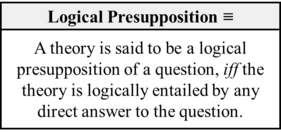Logical Presupposition
What is logical presupposition? How should it be defined?
While theories are answers to questions, questions presuppose theories. The concept of logical presupposition is meant to denote the logical (as opposed to epistemic) aspect of the relation of presupposition.
In the scientonomic context, this term was first used by Hakob Barseghyan and Nichole Levesley in 2021. The term is currently accepted by Scientonomy community.
In Scientonomy, the accepted definition of the term is:
- A theory is said to be a logical presupposition of a question, iff the theory is logically entailed by any direct answer to the question.
Contents
Scientonomic History
Acceptance Record of the Term
| Community | Accepted From | Acceptance Indicators | Still Accepted | Accepted Until | Rejection Indicators |
|---|---|---|---|---|---|
| Scientonomy | 1 August 2021 | This is when Barseghyan and Levesley's Question Dynamics that offered a definition of the term was published. This is a good indication that the question of how the term is to be defined is considered legitimate by the community. | Yes |
All Definitions
| Theory | Formulation | Formulated In |
|---|---|---|
| Logical Presupposition (Barseghyan-Levesley-2021) | A theory is said to be a logical presupposition of a question, iff the theory is logically entailed by any direct answer to the question. | 2021 |
Accepted Definitions
| Community | Theory | Formulation | Accepted From | Accepted Until |
|---|---|---|---|---|
| Scientonomy | Logical Presupposition (Barseghyan-Levesley-2021) | A theory is said to be a logical presupposition of a question, iff the theory is logically entailed by any direct answer to the question. | 6 February 2023 |
Suggested Modifications
| Modification | Community | Date Suggested | Summary | Date Assessed | Verdict | Verdict Rationale |
|---|---|---|---|---|---|---|
| Sciento-2021-0001 | Scientonomy | 1 August 2021 | Accept the definitions of logical presupposition and epistemic presupposition. | 6 February 2023 | Accepted | It was emphasized that the "modification is appealing given the presence of questions as a basic class of epistemic element in our ontology and the need to reference their presuppositions in observational scientonomy alongside proposed laws concerning questions in theoretical scientonomy".c1 The commentators agreed that "an epistemic agent could plausibly accept all the epistemic presuppositions without necessarily accepting all the logical presuppositions".c2 They also also noted that "accepting separate definitions of logical presupposition and epistemic presupposition would improve the specificity of our communal knowledge - and perhaps our visualization capabilities".c3 Specifically, "there is clear value in distinguishing logical and epistemic presuppositions in scientonomic diagrams".c4 Finally, the commentators highlighted the importance of the distinction for the law of question acceptance.c5 c6 |
Current Definition
In Scientonomy, the accepted definition of the term is Logical Presupposition (Barseghyan-Levesley-2021).
Logical Presupposition (Barseghyan-Levesley-2021) states: "A theory is said to be a logical presupposition of a question, iff the theory is logically entailed by any direct answer to the question."
TODO: Nikki add a description
Ontology
Existence
In Scientonomy, it is currently accepted that "There is such a thing as a logical presupposition."
Subtypes
In Scientonomy, there are currently no accepted subtypes of Logical Presupposition.
Supertypes
In Scientonomy, there are currently no accepted supertypes of Logical Presupposition.
If a question concerning the ontology of a logical presupposition is missing, please add it here.
Dynamics
If a question concerning the dynamics of a logical presupposition is missing, please add it here.
